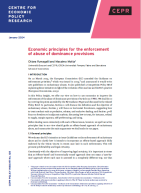Key points include:
- The Guidelines should avoid ambiguity and unclear objectives and should focus on proving anti-competitive effects that harm consumers in cases of exclusionary abuse.
- Practices referencing rivals, like exclusive dealing and exclusivity rebates, should be presumptively abusive, with the burden of proof on the dominant firm.
- Price-cost tests are essential for certain practices, but their results should be interpreted within a well-formulated theory of harm.
- In vertical foreclosure cases, the input at issue should be a crucial asset but not necessarily an indispensable one. All vertical foreclosure cases (including both outright and constructive refusal to supply cases), should be subject to this principle.
- Limiting vertical foreclosure actions to dominant firms who have not committed considerable resources to develop the input or are already subject to regulatory obligations, can preserve incentives for innovation.
Overall, the Policy Insight provides useful suggestions for an informed and effects-based approach in enforcing Article 102 TFEU. Policymakers should consider these insights to ensure a nuanced and effective framework that addresses anti-competitive practices while fostering innovation and investment.




